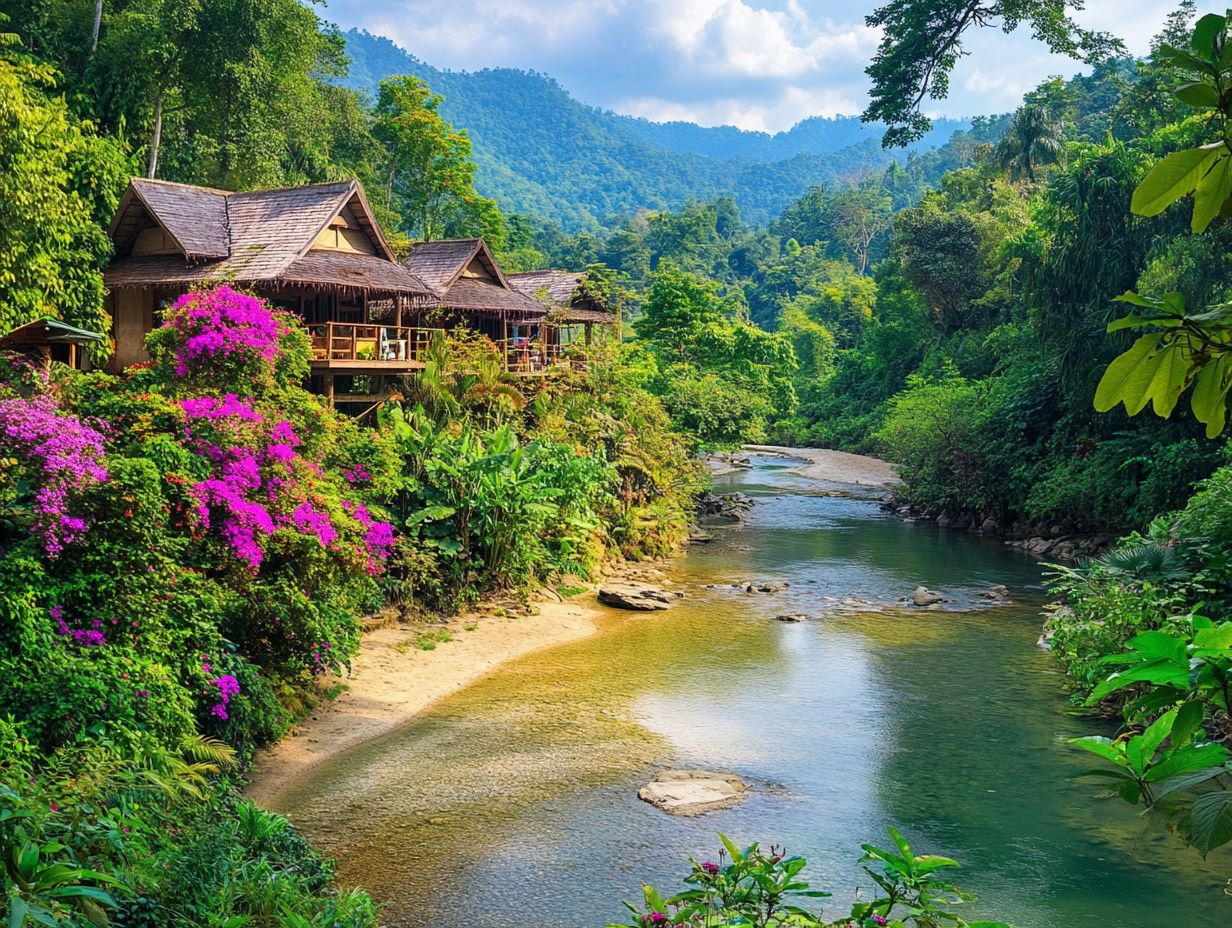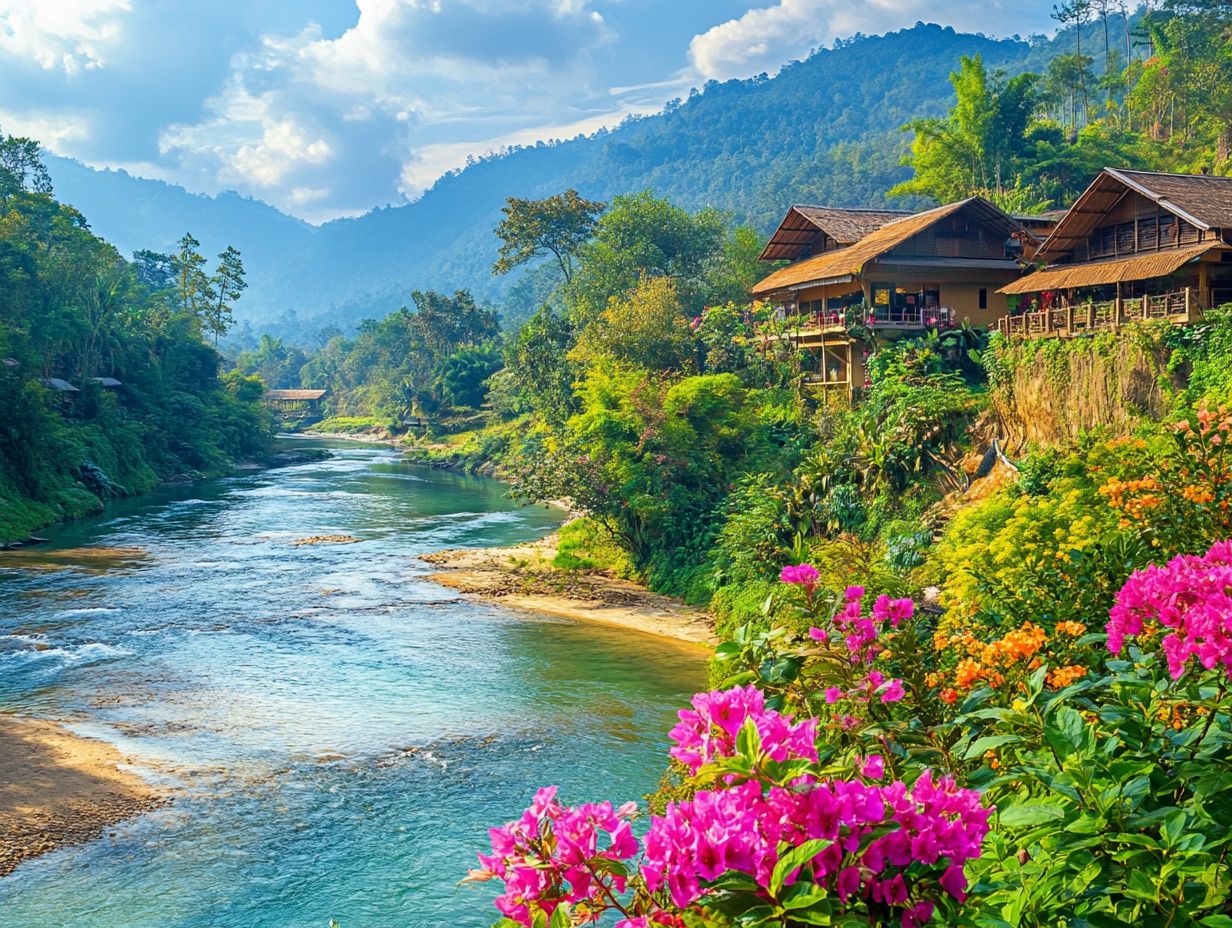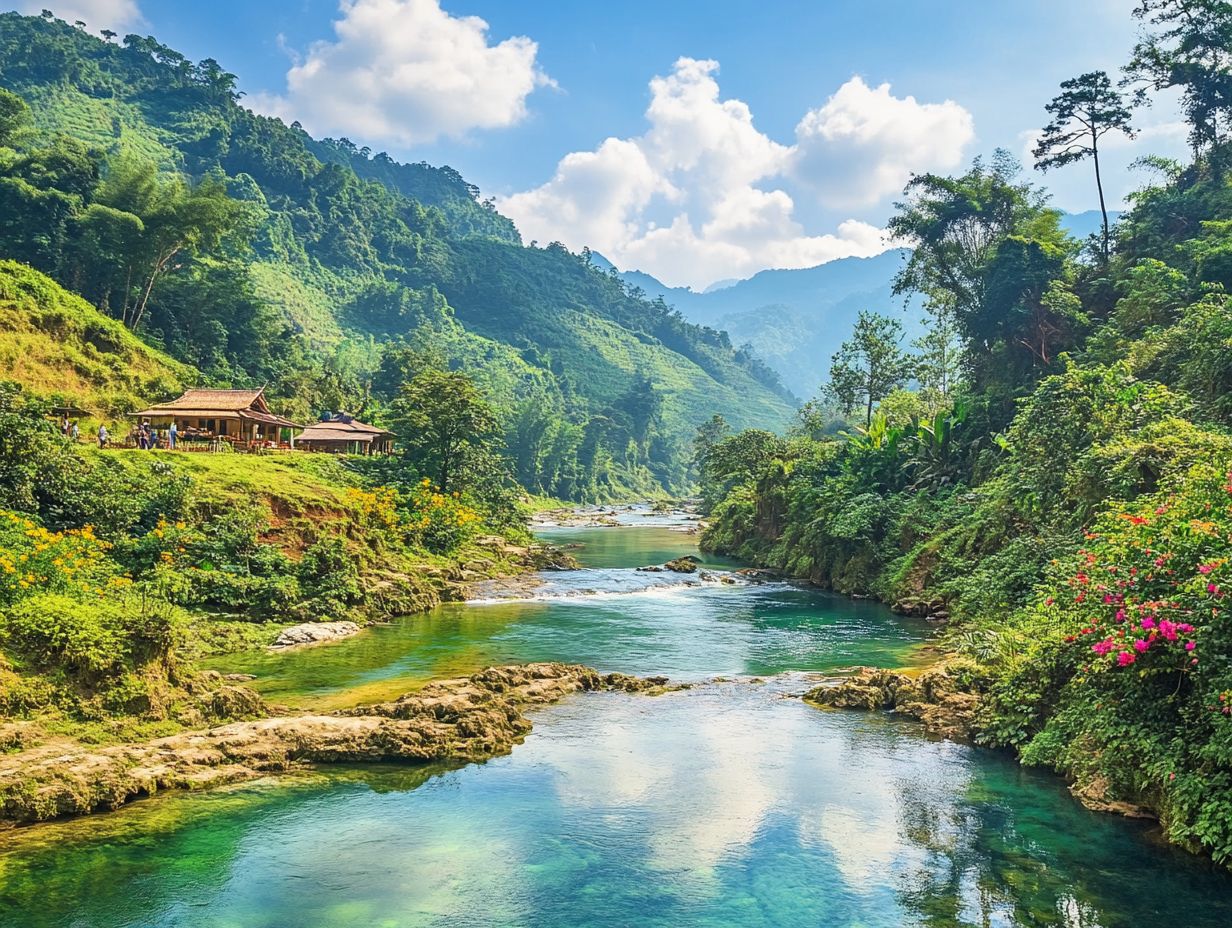The Most Sustainable Travel Places in Asia
Considering a journey through Asia while keeping your environmental footprint in check? This article showcases 15 breathtaking destinations that prioritize sustainability, ranging from the tranquil beauty of Bhutan to the lively streets of Hoi An, Vietnam.
Each location not only boasts stunning vistas and rich cultural experiences but also emphasizes eco-friendly practices and community involvement. You’ll uncover how your travel choices can play a vital role in preserving these unique environments and cultures, along with practical tips to enhance the sustainability of your journey.
Start your exciting journey toward responsible travel today!
Contents
- Key Takeaways:
- 1. Bhutan
- 2. Lombok, Indonesia
- 3. Chiang Mai, Thailand
- 4. Palawan, Philippines
- 5. Kyoto, Japan
- 6. Hoi An, Vietnam
- 7. Kerala, India
- 8. Luang Prabang, Laos
- 9. Borneo, Malaysia
- 10. Yangshuo, China
- 11. The Maldives
- 12. Gili Islands, Indonesia
- 13. Koh Lanta, Thailand
- 14. Siem Reap, Cambodia
- 15. Langkawi, Malaysia
- What Makes These Destinations Sustainable?
- Frequently Asked Questions
- What are the most sustainable travel places in Asia?
- What makes Bhutan a sustainable travel destination?
- How does Japan promote sustainable tourism?
- Is Thailand a sustainable travel destination?
- What sustainable practices can tourists participate in when visiting Indonesia?
- What makes Taiwan a sustainable travel destination?
Key Takeaways:

- Choose sustainable travel destinations like Bhutan and Lombok for a guilt-free and eco-friendly vacation.
- Support local communities and preserve the environment by opting for sustainable travel in Chiang Mai and Palawan.
- Travel responsibly and contribute to sustainable tourism in Kyoto and Kerala for a more authentic and impactful experience.
1. Bhutan
Bhutan truly stands out as a beacon of sustainable tourism. Here, cultural heritage and local communities take center stage, ensuring that the environmental impact is minimal. This approach enriches your experience through responsible tourism practices. The kingdom’s distinctive approach champions the preservation of local cultures, biodiversity, and natural habitats. Bhutan serves as a shining example of eco-friendly initiatives.
You can immerse yourself in the rich traditions of Bhutanese life, from exploring traditional crafts to participating in community maintenance efforts that bolster local businesses and promote sustainable livelihoods.
To align with this vision, Bhutan offers a range of eco-friendly accommodations, such as lodges powered by solar energy and constructed with sustainable materials. This significantly reduces the carbon footprint associated with tourism.
Join guided treks led by locals for authentic experiences while directly supporting the community by sharing profits. The government actively promotes initiatives like organic farming tours and community-based homestays. This allows you to closely connect with local cultures while protecting the environment.
These practices not only preserve Bhutan’s unique cultural identity but also inspire a deeper connection between you and the majestic landscapes you explore.
2. Lombok, Indonesia
Lombok, Indonesia, is emerging as a gem in the world of sustainable tourism. Eco-friendly practices seamlessly blend with nature’s stunning allure, offering a plethora of adventure activities designed for eco-conscious travelers like you.
The island’s dedication to sustainability shines through in its selection of eco-friendly accommodations. This ensures that your stay is both luxurious and mindful of the environment.
For adventure seekers, trekking through the rugged landscapes allows you to dive deep into Lombok s diverse ecosystems while forging connections with local communities.
Participating in traditional fishing methods provides a fascinating glimpse into Lombok s rich cultural heritage. At the same time, engaging in beach clean-ups cultivates a shared responsibility to protect the breathtaking beauty that captivates visitors.
Lombok combines adventure and community involvement, making it a unique destination for those seeking travel experiences that resonate on a deeper level.
3. Chiang Mai, Thailand
Discover the vibrant hub of Chiang Mai, where sustainable tourism comes to life! Engage in hands-on cultural experiences and savor the exquisite local cuisine while supporting community tourism and organic farming initiatives.
As you explore traditional crafts at local workshops or indulge in the delights of community markets brimming with organic produce, you will find yourself deeply connected to the region’s rich heritage. Culinary tours showcase authentic flavors while shining a spotlight on local businesses committed to eco-friendly practices.
By participating in these activities, you not only enhance your understanding of Chiang Mai’s culture but also make a positive contribution to the environment.
The synergy between local artisans and organic farmers plays a crucial role in promoting ecological sustainability, ensuring that the beauty of Chiang Mai can be cherished for generations to come.
4. Palawan, Philippines
Palawan, often hailed as the last ecological frontier of the Philippines, offers a pristine environment that champions sustainable tourism, biodiversity, and wildlife protection within its protected areas.
This tropical paradise is a treasure trove of lush rainforests, vibrant coral reefs, and endemic species. Eco-tourism initiatives, including guided wildlife tours and conservation-focused activities, play a vital role in raising awareness about the critical importance of preserving these natural habitats.
Discover a variety of eco-friendly lodges and community-run homestays, each committed to minimizing environmental impact. Local communities actively engage in conservation efforts, promoting responsible tourism while ensuring their traditional practices align with the mission to safeguard these irreplaceable ecosystems for future generations.
5. Kyoto, Japan
Kyoto, Japan, is rich in cultural heritage, where sustainable tourism practices beautifully intertwine with traditional crafts and immersive experiences. Here, the past is honored while paving the way for renewable energy.
As you explore this vibrant city, local artisans invite you to witness the revival of age-old crafts like kimono weaving and pottery. You can roll up your sleeves in hands-on workshops that showcase the meticulous artistry involved, contributing to the local economy and promoting cultural heritage.
Community tourism initiatives encourage direct engagement with neighborhoods, allowing for deeper connections with locals while respecting Kyoto’s unique social fabric. Many small businesses are adopting renewable energy solutions, such as solar panels and energy-efficient practices. Experience how your travels can help preserve the city s cultural essence while supporting a future that s environmentally conscious.
6. Hoi An, Vietnam
Hoi An, Vietnam, beckons with its enchanting allure, where sustainable tourism flourishes amid local cultures, traditional crafts, and eco-friendly lodging options.
This charming town takes pride in safeguarding its heritage by encouraging artisans to uphold their timeless crafts, such as lantern-making and pottery. Attend engaging workshops and vibrant local markets that showcase the local cuisine and traditional fishing methods.
As a visitor, you ll find eco-friendly accommodations that not only minimize your environmental footprint but also create employment opportunities for local families, strengthening the community.
With initiatives like guided cycling tours through lush rice paddies and cooking classes featuring organic ingredients, immerse yourself in Hoi An s rich culture while practicing responsible tourism. Ensure this captivating destination thrives for generations to come.
7. Kerala, India

Kerala, often hailed as ‘God’s Own Country’, presents a masterclass in sustainable tourism that blends eco-tourism with the region s rich biodiversity and vibrant local cuisine.
The state’s commitment to sustainability is evident through its myriad eco-friendly initiatives, including innovative renewable energy projects and effective waste management programs. These efforts not only protect breathtaking landscapes but also support community-driven initiatives that uplift local businesses and artisans.
By promoting eco-conscious experiences, Kerala invites you to immerse yourself in its stunning flora and fauna. Discover unique opportunities like guided nature walks through lush forests and visits to thriving organic farms.
This intricate tapestry of biodiversity sets the stage for unforgettable tourism activities, such as adventure tourism and ecological sites, nurturing a sense of environmental responsibility within the local community.
8. Luang Prabang, Laos
Luang Prabang invites you to discover a serene blend of sustainable tourism and cultural experiences, where you can discover the incredible variety of plants and animals while helping the community and enjoying local culture.
This enchanting town has rolled out various community tourism initiatives designed to enable local residents while championing environmental stewardship. For instance, the Living Land Company offers hands-on experiences in organic rice farming. Here, you gain insights into traditional practices and sustainable agriculture. These initiatives not only preserve age-old agricultural methods but also provide a vital source of income for local farmers.
Eco-friendly tours allow you to connect with local artisans, witness traditional crafts in action, and actively participate in conservation efforts. By doing so, you enrich your travel experience while supporting the preservation of Luang Prabang s unique cultural heritage.
9. Borneo, Malaysia
Borneo, Malaysia, is a breathtaking paradise for eco-tourism, where you can experience sustainable practices that prioritize wildlife protection and foster initiatives benefiting both the environment and local communities.
The lush rainforests of Borneo are home to an astonishing array of species, making wildlife conservation a key part of tourism here. Efforts such as habitat preservation and anti-poaching programs get strong support from both local governments and environmentally-conscious travelers like yourself.
In terms of accommodations, you can choose from eco-friendly options, ranging from tree-top lodges to sustainable resorts. This allows you to immerse yourself in nature while minimizing your environmental footprint.
Your engagement in ecotourism activities enhances your experience. You can partake in local traditions, support artisans, and learn about conservation efforts directly from the communities dedicated to preserving their unique environments.
10. Yangshuo, China
Yangshuo, China, is a breathtaking destination that perfectly captures the essence of sustainable tourism with exciting activities focused on protecting the environment while promoting local produce.
In this remarkable region, you ll find stunning limestone karsts and picturesque rivers. You can fully immerse yourself in its natural beauty while minimizing your environmental footprint. Picture yourself kayaking, rock climbing, or cycling along scenic trails all crafted to honor the vibrant ecosystems and wildlife that thrive here.
Local communities share their knowledge of sustainable farming. This helps preserve the area’s beauty and deepens your experience, offering a greater understanding of the region’s rich cultural heritage and locally sourced products.
Embrace a more responsible tourism experience that leaves a positive mark on both you and the environment.
11. The Maldives
The Maldives delights with stunning views and an unwavering commitment to sustainable tourism. Stay in luxury tents or eco-lodges for an unforgettable experience that champions biodiversity and wildlife protection.
These distinctive accommodations not only provide stunning views of the turquoise waters but also embrace eco-friendly practices, such as harnessing solar energy, harvesting rainwater, and utilizing locally sourced materials. Many of these establishments actively involve you in conservation initiatives. Join efforts in conservation, including:
- Coral reef restoration
- Beach clean-ups
- Educational programs about marine life
With sustainable farming techniques in play, fresh produce is readily available while minimizing environmental impact. By prioritizing responsible practices, you can dive into a luxurious getaway that also supports the environment!
12. Gili Islands, Indonesia
The Gili Islands in Indonesia are a perfect example of sustainable tourism, where environmentally friendly programs support community well-being and protect a variety of plants and animals, all while offering you a slice of paradise.
These programs not only beautify the islands but also empower local residents by actively involving them in eco-tourism activities. Community-led initiatives focus on preserving delicate marine ecosystems, promoting coral reef rehabilitation, and teaching you about the vital importance of biodiversity.
Sustainable practices, such as waste management and renewable energy use, preserve the islands’ cultural integrity. This creates a harmonious blend of modern tourism and traditional lifestyles. By engaging in these practices, you help create a brighter future for the islands and their residents, fostering a dynamic interplay between tourism and local culture.
13. Koh Lanta, Thailand
Koh Lanta welcomes you to experience its beautiful charm, inviting you to immerse yourself in a world where sustainable tourism reigns supreme. This enchanting island is committed to preserving its diverse ecosystems while ensuring you have unforgettable experiences.
By choosing eco-conscious lodgings, you can enjoy the beauty of nature without leaving a significant carbon footprint. With various initiatives focused on protecting endangered species, like sea turtles, and offering responsible trekking excursions that educate you on local flora and fauna, your adventures here contribute to vital conservation efforts.
Whether you re snorkeling in pristine waters or joining beach clean-ups, you ll find countless opportunities to connect with the island s natural beauty while being mindful of its preservation. Each moment spent here is both abundant and immensely rewarding.
14. Siem Reap, Cambodia

Siem Reap, Cambodia, is more than just a gateway to the ancient temples of Angkor; it stands as a shining example of sustainable tourism. Here, the preservation of cultural heritage and community well-being are woven into the visitor experience.
You ll find an approach that prioritizes engaging local communities, showcasing traditional crafts, and promoting environmentally friendly initiatives that enhance both the environment and your journey. Community-led tourism projects, such as artisan workshops and organic farming initiatives, give locals a platform to share their rich culture while generating income.
These efforts not only spotlight the region’s unique heritage but also instill a profound sense of pride and ownership among the locals. Eco-friendly accommodations also play a vital role in preserving the stunning natural beauty of the surrounding areas, ensuring that you and future generations can fully appreciate Siem Reap in all its splendor.
15. Langkawi, Malaysia
Langkawi, Malaysia, is your tropical paradise that embraces sustainable tourism, weaving together biodiversity conservation and environmentally friendly programs while involving the local community in the preservation of its natural heritage.
The island s commitment to safeguarding its lush landscapes and vibrant ecosystems shines through various initiatives designed to protect endangered species and habitats. You ll find that local programs, such as the establishment of marine parks and wildlife sanctuaries, are essential in maintaining a delicate balance in the environment.
Residents actively participate in tourism projects that highlight their rich cultural heritage while promoting responsible travel practices. By nurturing a sense of stewardship among both locals and visitors, Langkawi strives to create a harmonious relationship between tourism and conservation, ensuring that its breathtaking beauty endures for generations to come.
What Makes These Destinations Sustainable?
The sustainability of these destinations relies on your commitment to responsible tourism practices. By mitigating environmental impact and fostering environmentally friendly projects, you play a vital role in engaging local communities in conservation efforts.
When you focus on effective waste management strategies, you not only help reduce litter and pollution but also inspire fellow visitors to adopt similar practices. Community involvement is crucial; local residents become active participants in the tourism experience, sharing their rich cultural heritage, traditions, and culinary delights that truly enhance your journey.
Through biodiversity preservation efforts, these destinations maintain their natural beauty and wildlife, ensuring that you and future generations can relish breathtaking landscapes and experiences. Such practices protect the environment while nurturing a deeper connection between you and the places you visit, creating lasting memories.
How Can Travelers Contribute to Sustainable Tourism in These Places?
Travelers hold a vital position in promoting sustainable tourism by actively engaging in responsible practices that bolster local communities and eco-friendly initiatives during their journeys.
You can begin by choosing accommodations that emphasize sustainability, such as those that harness renewable energy or implement water conservation measures. For instance, consider the top 10 eco-friendly hotels in Asia. Participating in local community activities like workshops or guided tours led by artisans not only enriches your travel experience but also contributes to the local economy.
It’s essential to remain mindful of wildlife protection efforts and the environmental impact of your choices. This means observing animals from a respectful distance, avoiding attractions that exploit wildlife, and educating yourself about the delicate balance of the environment. By making these thoughtful choices, you can make a lasting impact on the destinations you hold dear.
What Are the Benefits of Choosing a Sustainable Travel Destination?
Selecting a sustainable travel destination brings a wealth of advantages. It promotes environmental sustainability, cultivates richer connections with local cultures, and offers immersive experiences that genuinely enhance your adventure.
Prioritizing eco-friendly practices helps conserve natural landscapes and wildlife, contributing to the fight against climate change and ensuring a healthier planet for generations to come. Engaging with local communities allows you to partake in meaningful exchanges that honor cultural heritage, traditions, and customs fostering a deeper understanding that transcends typical tourist experiences.
Embracing sustainable tourism leads to unique adventures off the beaten path, unveiling the authentic beauty of your destination. From savoring locally sourced cuisine to participating in community-led initiatives, such as beach clean-ups and supporting local businesses, you ll create lifelong memories while actively supporting a flourishing, responsible travel landscape.
What Are Some Other Sustainable Travel Destinations in Asia?
Across Asia, a wealth of sustainable travel destinations is emerging, each highlighting eco-tourism practices that prioritize community engagement and biodiversity conservation through various tourism initiatives.
These locations strive to protect natural habitats and invite you to partake in authentic cultural exchanges. Take Bali, for instance, famous for its lush landscapes and thriving eco-tourism. Here, you can join initiatives like mangrove planting and beach clean-ups, actively participating in the preservation of the island’s delicate ecosystem and supporting local conservation efforts. For more inspiration, check out traveling sustainably: the best locations.
Similarly, in Chiang Mai, Thailand, community-based tourism meaning living and working with local people allows you to immerse yourself in traditional rice farming, traditional crafts, and experience the river lifestyle. In Bhutan, the innovative practice of high value, low impact tourism ensures that your visit contributes positively to the environment while allowing you to experience the country s rich spiritual culture and engaging in eco-friendly initiatives.
Engaging in these initiatives not only enhances your travel experience but also makes it meaningful and environmentally responsible, showcasing how sustainable travel can embody both adventure and community maintenance.
Join us in preserving our planet by choosing eco-friendly travel options!
How Can Sustainable Travel Help Preserve the Environment and Local Cultures?
Sustainable travel is your key to preserving the environment and enriching local cultures. By embracing responsible tourism practices, you can significantly reduce carbon emissions while actively engaging communities in vital conservation efforts.
When you choose eco-lodges and community-based tourism, you stay in local accommodations. These places prioritize a minimal environmental footprint. Take Costa Rica, for instance: many eco-lodges harness renewable energy and invite guests to participate in reforestation projects. This approach bolsters local ecosystems and supports local produce initiatives.
Discover the vibrant Maori traditions in New Zealand. Engage with local communities and experience their rich culture firsthand! Programs within indigenous territories allow you to immerse yourself while respecting and preserving the community s cultural integrity. These initiatives elevate your travel experience and promote economic independence for local populations, showcasing how sustainable travel nurtures a harmonious relationship between the tourism sector and environmental health.
Frequently Asked Questions

What are the most sustainable travel places in Asia?
According to our reference data, some of the most sustainable travel places in Asia are Bhutan, Japan, Thailand, Indonesia, Taiwan, and South Korea. Each of these locations emphasizes eco-friendly practices and local community engagement.
What makes Bhutan a sustainable travel destination?
Bhutan is known for its Gross National Happiness index, which measures the well-being of its citizens and emphasizes happiness over economic growth. It also has a strict policy of limiting the number of tourists to preserve its culture and environment while promoting responsible tourism practices.
How does Japan promote sustainable tourism?
Japan has implemented various initiatives such as the “Cool Japan” campaign. This promotes sustainable tourism practices, including the use of eco-friendly transportation and the preservation of cultural heritage through local crafts and community tourism.
Is Thailand a sustainable travel destination?
Thailand has made significant efforts to promote sustainable tourism. This includes the use of renewable energy sources, the promotion of eco-friendly activities, and the implementation of responsible waste management practices across its tourist destinations.
What sustainable practices can tourists participate in when visiting Indonesia?
Tourists in Indonesia can support sustainable tourism by staying at eco-friendly accommodations, purchasing locally made products, and participating in responsible wildlife tourism activities. These efforts contribute to conservation and biodiversity.
What makes Taiwan a sustainable travel destination?
Taiwan has implemented measures to reduce its carbon footprint and promote sustainable tourism. This includes banning single-use plastic bags and encouraging green transportation options like biking and public transport. Such initiatives foster eco-friendly practices among visitors.
Join the movement towards sustainable travel! Explore these destinations and share your experiences with others.





